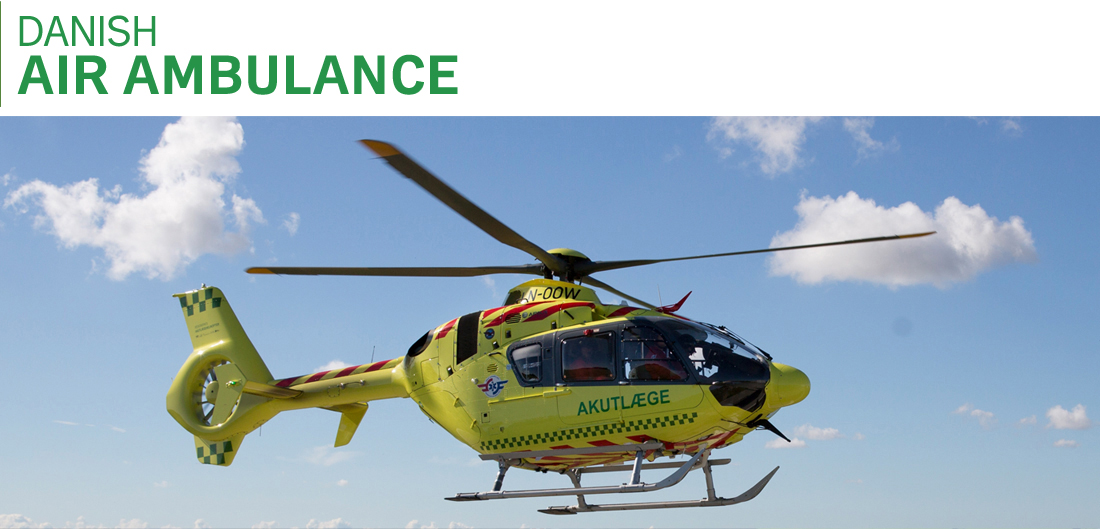27 June 2016
For the first time, patients who have needed emergency medical helicopter assistance have been asked about their experience. The user survey paints a picture of highly satisfied patients.
The vast majority of patients find that the helicopter emergency physician and the rest of the helicopter crew members perform the emergency assistance in a calm and very competent manner, which means that the patients feel secure in the situation despite the often life-threatening circumstances.
“I’m deeply impressed with the competence and assurance shown throughout the course of events” and “They must be people of a particular stamp who can act so calm and collected even though everything happens so quickly” are a couple of the comments made by the patients to describe their experience of the assistance provided by the flying hospital crew.
First user survey
To acquire greater knowledge about how patients experience the course of treatment and about what is important to them, Danish Air Ambulance has now conducted its first user survey with both questionnaires and personal interviews.
The survey shows that satisfaction with the services provided is very high and that the three helicopter emergency response units provide a uniform service of good quality. 99% of the patients characterise the overall impression of their experience as ‘very good’ (90%) or ‘good’ (9%). For the other questions, the level of satisfaction varies from 95% to 100% when the two positive response categories are added up.
“We’re pleased that the patients are so satisfied with their experience. It’s perhaps not so surprising considering that this is highly specialised emergency assistance provided by very experienced staff. But the survey provides good knowledge about the patients’ perspective, which we can use in the future development of our emergency response. I’m especially pleased that the patients experience that the transfer from helicopter to hospital functions quickly and professionally, because creating smooth transitions is an important focus area across the public health service,” says Svend Hartling, Chairman of the Steering Committee for Danish Air Ambulance.
Communication in critical moments
The level of satisfaction is extra high for questions about how the helicopter emergency physician handled the situation as well as whether he or she provided good treatment and care. At the same time, the patients state these questions as being particularly important to their experience of quality, so it is important to maintain the good service in these areas. There are also a few areas with development potential. For example, there was slightly lower satisfaction with how the helicopter emergency physician prepared the patient for what would happen during the flight. The same applies to the question about whether the helicopter emergency physician used a language that was easy to understand. However, the patients themselves assess these issues as being less important.
“Our patients are often in an acute critical condition. Treatment and flight safety therefore have absolute top priority. Good communication helps increase a sense of security and creates the necessary calm in critical situations, which means that this is also an important part of the task. We therefore read the survey with great interest and use the new knowledge in a number of areas, including how, in a given situation, we can become better at telling the patients what happens during the process,” says Troels Martin Hansen, Medical Director of Danish Air Ambulance.
The patient’s experience of quality
To help the work to strengthen patient-experienced quality, the survey has summarised what patients regard as good practice and quality. This includes elements like the following:
- that the helicopter emergency physician continuously tells the patient what they are doing and what is going to happen, before, during and after the flight
- that a good and positive atmosphere is created, both in the relationship between treatment provider and patient and between the treatment providers mutually
- that the helicopter emergency physician’s behaviour radiates calm and competence
- that the helicopter emergency physician informs the patient about his or her condition during the course of treatment
- that the patient is provided with information in an ordinary Danish and without the use of medical specialist terminology.
Facts about the user survey
- Comprises 597 patients
- 76% filled in a questionnaire sent to them
- 32 patients participated in telephone interviews
- Patients who were not conscious during the helicopter transport did not participate
The survey was conducted by DEFACTUM, Central Denmark Region
Read the full report here (in Danish)
